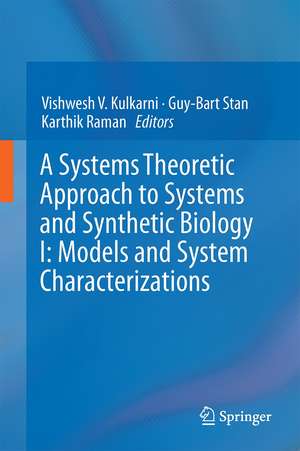A Systems Theoretic Approach to Systems and Synthetic Biology I: Models and System Characterizations
Editat de Vishwesh V. Kulkarni, Guy-Bart Stan, Karthik Ramanen Limba Engleză Hardback – 16 iul 2014
Systems and control theory is a branch of engineering and applied sciences that rigorously deals with the complexities and uncertainties of interconnected systems with the objective of characterising fundamental systemic properties such as stability, robustness, communication capacity, and other performance metrics. Systems and control theory also strives to offer concepts and methods that facilitate the design of systems with rigorous guarantees on these properties. Over the last 100 years, it has made stellar theoretical and technological contributions in diverse fields such as aerospace, telecommunication, storage, automotive, power systems, and others. Can it have, or evolve to have, a similar impact in biology? The chapters in this book demonstrate that, indeed, systems and control theoretic concepts and techniques can have a significant impact in systems and synthetic biology.
Volume I provides a panoramic view that illustrates the potential of such mathematical methods in systems and synthetic biology. Recent advances in systems and synthetic biology have clearly demonstrated the benefits of a rigorous and systematic approach rooted in the principles of systems and control theory - not only does it lead to exciting insights and discoveries but it also reduces theinordinately lengthy trial-and-error process of wet-lab experimentation, thereby facilitating significant savings in human and financial resources. In Volume I, some of the leading researchers in the field of systems and synthetic biology demonstrate how systems and control theoretic concepts and techniques can be useful, or should evolve to be useful, in order to understand how biological systems function.
As the eminent computer scientist Donald Knuth put it, "biology easily has 500 years of exciting problems to work on". This edited book presents but a small fraction of those for the benefit of (1) systems and control theorists interested in molecular and cellular biology and (2) biologists interested in rigorous modelling, analysis and control of biological systems.
| Toate formatele și edițiile | Preț | Express |
|---|---|---|
| Paperback (1) | 1097.36 lei 6-8 săpt. | |
| SPRINGER NETHERLANDS – 18 sep 2016 | 1097.36 lei 6-8 săpt. | |
| Hardback (1) | 1104.32 lei 6-8 săpt. | |
| SPRINGER NETHERLANDS – 16 iul 2014 | 1104.32 lei 6-8 săpt. |
Preț: 1104.32 lei
Preț vechi: 1162.43 lei
-5% Nou
Puncte Express: 1656
Preț estimativ în valută:
211.32€ • 225.97$ • 176.19£
211.32€ • 225.97$ • 176.19£
Carte tipărită la comandă
Livrare economică 17 aprilie-01 mai
Preluare comenzi: 021 569.72.76
Specificații
ISBN-13: 9789401790406
ISBN-10: 940179040X
Pagini: 352
Ilustrații: XVIII, 332 p. 84 illus., 41 illus. in color.
Dimensiuni: 155 x 235 x 24 mm
Greutate: 0.67 kg
Ediția:2014
Editura: SPRINGER NETHERLANDS
Colecția Springer
Locul publicării:Dordrecht, Netherlands
ISBN-10: 940179040X
Pagini: 352
Ilustrații: XVIII, 332 p. 84 illus., 41 illus. in color.
Dimensiuni: 155 x 235 x 24 mm
Greutate: 0.67 kg
Ediția:2014
Editura: SPRINGER NETHERLANDS
Colecția Springer
Locul publicării:Dordrecht, Netherlands
Public țintă
ResearchCuprins
1 On the Mathematics of the Law of Mass Action.- 2 Structural Analysis of Biological Networks.- 3 Guaranteeing Spatial Uniformity in Reaction-Diffusion Systems Using Weighted L2-norm Contractions.- 4 Robust Tunable Transcriptional Oscillators using Dynamic Inversion.- 5 Towards the Modular Decomposition of the Metabolic Network.- 6 An Optimal Control Approach to Seizure Detection in Drug-Resistant Epilepsy.- 7 Model Reduction of Genetic-Metabolic Networks via Time-Scale Separation.- 8 Networks, Metrics, and Systems Biology.- 9 Understanding and Predicting Biological Networks Using Linear System Identification.- 10 Model Checking in Biology.- 11 Computational Design of Informative Experiments in Systems Biology.- 12 Predicting Phenotype from Genotype through Reconstruction and Integrative Modeling of Metabolic and Regulatory Networks.- Index.
Textul de pe ultima copertă
The complexity of biological systems has intrigued scientists from many disciplines and has given birth to the highly influential field of systems biology wherein a wide array of mathematical techniques, such as flux balance analysis, and technology platforms, such as next generation sequencing, is used to understand, elucidate, and predict the functions of complex biological systems. More recently, the field of synthetic biology, i.e., de novo engineering of biological systems, has emerged. Scientists from various fields are focusing on how to render this engineering process more predictable, reliable, scalable, affordable, and easy.
Systems and control theory is a branch of engineering and applied sciences that rigorously deals with the complexities and uncertainties of interconnected systems with the objective of characterising fundamental systemic properties such as stability, robustness, communication capacity, and other performance metrics. Systems and control theory also strives to offer concepts and methods that facilitate the design of systems with rigorous guarantees on these properties. Over the last 100 years, it has made stellar theoretical and technological contributions in diverse fields such as aerospace, telecommunication, storage, automotive, power systems, and others. Can it have, or evolve to have, a similar impact in biology? The chapters in this book demonstrate that, indeed, systems and control theoretic concepts and techniques can have a significant impact in systems and synthetic biology.
Volume I provides a panoramic view that illustrates the potential of such mathematical methods in systems and synthetic biology. Recent advances in systems and synthetic biology have clearly demonstrated the benefits of a rigorous and systematic approach rooted in the principles of systems and control theory - not only does it lead to exciting insights and discoveries but it also reduces the inordinately lengthy trial-and-error process of wet-lab experimentation, thereby facilitating significant savings in human and financial resources. In Volume I, some of the leading researchers in the field of systems and synthetic biology demonstrate how systems and control theoretic concepts and techniques can be useful, or should evolve to be useful, in order to understand how biological systems function.
As the eminent computer scientist Donald Knuth put it, "biology easily has 500 years of exciting problems to work on". This edited book presents but a small fraction of those for the benefit of (1) systems and control theorists interested in molecular and cellular biology and (2) biologists interested in rigorous modelling, analysis and control of biological systems.
Systems and control theory is a branch of engineering and applied sciences that rigorously deals with the complexities and uncertainties of interconnected systems with the objective of characterising fundamental systemic properties such as stability, robustness, communication capacity, and other performance metrics. Systems and control theory also strives to offer concepts and methods that facilitate the design of systems with rigorous guarantees on these properties. Over the last 100 years, it has made stellar theoretical and technological contributions in diverse fields such as aerospace, telecommunication, storage, automotive, power systems, and others. Can it have, or evolve to have, a similar impact in biology? The chapters in this book demonstrate that, indeed, systems and control theoretic concepts and techniques can have a significant impact in systems and synthetic biology.
Volume I provides a panoramic view that illustrates the potential of such mathematical methods in systems and synthetic biology. Recent advances in systems and synthetic biology have clearly demonstrated the benefits of a rigorous and systematic approach rooted in the principles of systems and control theory - not only does it lead to exciting insights and discoveries but it also reduces the inordinately lengthy trial-and-error process of wet-lab experimentation, thereby facilitating significant savings in human and financial resources. In Volume I, some of the leading researchers in the field of systems and synthetic biology demonstrate how systems and control theoretic concepts and techniques can be useful, or should evolve to be useful, in order to understand how biological systems function.
As the eminent computer scientist Donald Knuth put it, "biology easily has 500 years of exciting problems to work on". This edited book presents but a small fraction of those for the benefit of (1) systems and control theorists interested in molecular and cellular biology and (2) biologists interested in rigorous modelling, analysis and control of biological systems.
Caracteristici
New rigorous methods to obtain better predictive models of biological networks New results on the limits of performance in biological networks Includes novel applications of in vitro synthetic biology in nanotechnology Includes supplementary material: sn.pub/extras












